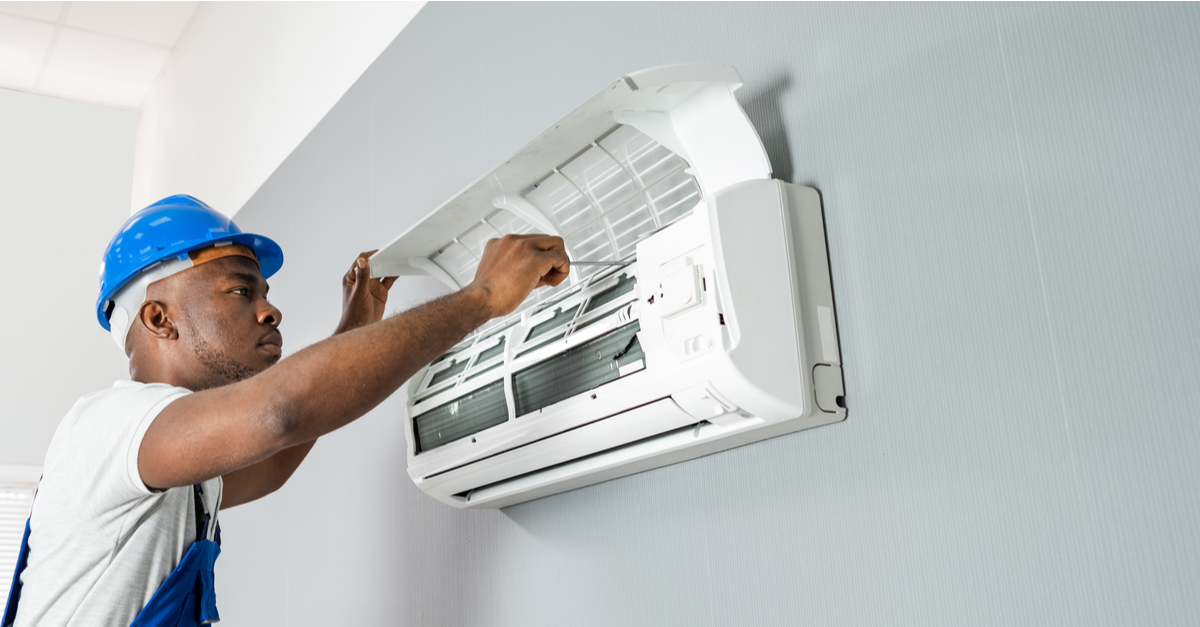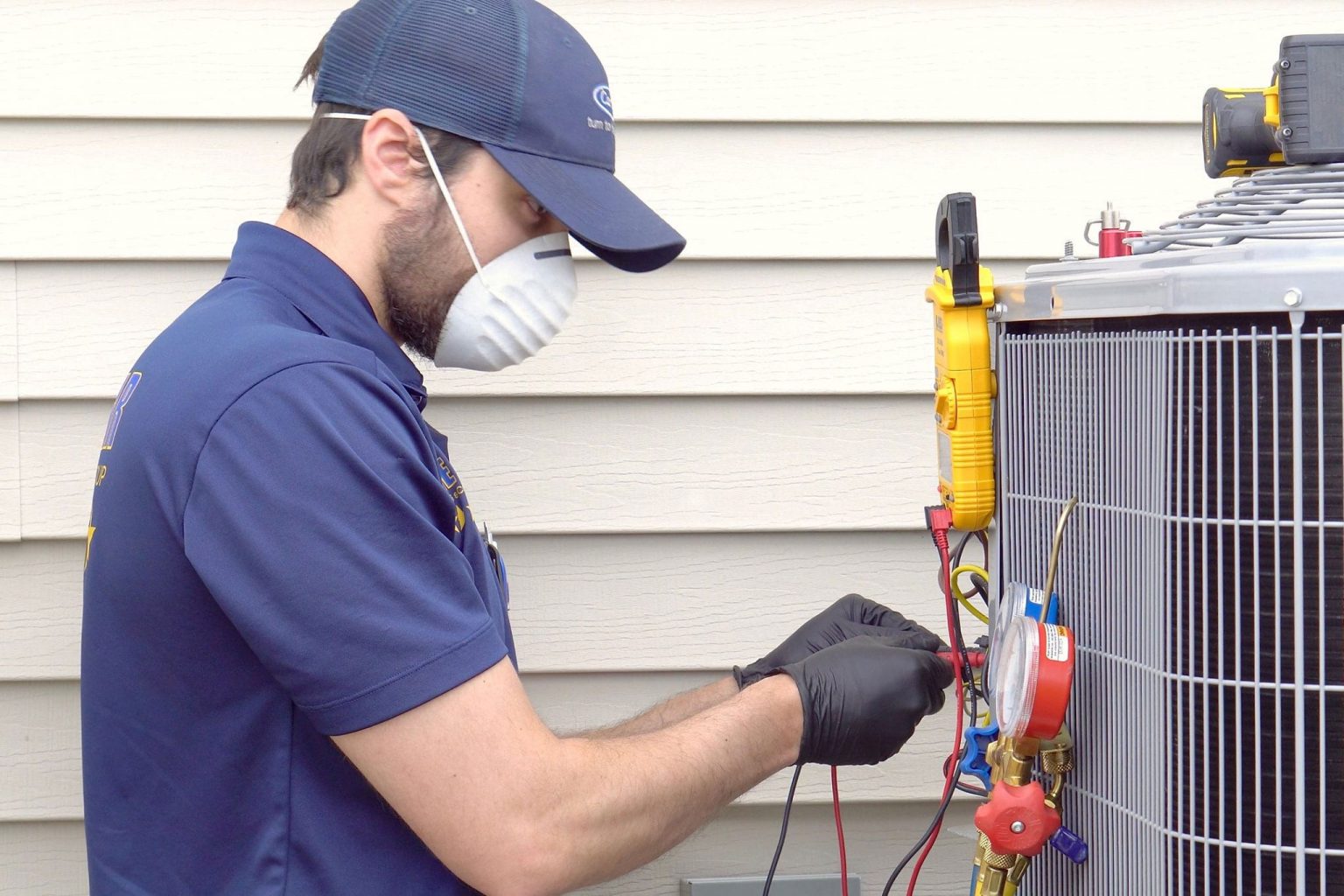Picture your air conditioning system as a master sculptor, expertly carving away at the overbearing warmth in your home, leaving behind an awesome, comfortable sanctuary. Have you ever before wondered exactly how this contemporary marvel accomplishes such an accomplishment?
The intricate dance of cooling agents, coils, compressors, and air ducts all operate in harmony to create that stimulating blast of cool air. However how exactly do these components integrated to develop that much-needed reprieve from the blistering warmth?
Allow's uncover the internal functions of a/c and debunk the scientific research behind staying cool.
Secret Takeaways
- Efficient ACs make use of cooling agents to absorb and launch warm, boosting air conditioning and power effectiveness.
- Regular maintenance makes certain optimal performance, long life, and energy financial savings.
- Proper sizing and style protect against power waste and guarantee also cooling circulation.
- Comprehending air movement characteristics and optimization improves cooling down effectiveness and comfort degrees.
The Fundamentals of Cooling
Comprehending the fundamentals of cooling can substantially improve your understanding of exactly how these systems run efficiently. Power performance is an important element of cooling, as it not just impacts your electricity costs however also the atmosphere. Reliable a/c unit make use of much less power to cool down an area, making them affordable and eco-friendly. By investing in an energy-efficient device, you can appreciate a comfy interior atmosphere while reducing your carbon footprint.
Moisture control is another important function of cooling. A/c unit help manage the moisture degrees in your house, producing a more comfy ambience. Excess humidity can result in mold and mildew development and pain, while low moisture levels can trigger dry skin and respiratory system concerns. A properly maintained air conditioner can effectively control humidity, guaranteeing a healthy and balanced and pleasurable living environment for you and your family members.
Comprehending exactly how cooling systems handle energy performance and moisture control can assist you make notified decisions when selecting and using these systems in your house.
Recognizing Cooling Agents and Their Role
When it pertains to a/c, recognizing cooling agents and their role is necessary. You'll discover the significance of refrigerants in cooling down systems and just how they assist in the heat transfer process.
Additionally, thinking about the ecological influence of cooling agents is vital for lasting cooling options.
Function of Refrigerants
Cooling agents play a vital duty in the procedure of ac unit by helping with the transfer of heat. The effectiveness of a cooling agent directly impacts the cooling procedure and energy consumption of the system.
When thinking about refrigerants, it's essential to evaluate their performance versus their ecological effects. Some refrigerants add to ozone depletion and global warming, motivating the look for greener choices. Lasting procedures concentrate on searching for cooling agent choices that are energy-efficient and have very little ecological impact.
Makers are progressively purchasing developing brand-new cooling agents that straighten with sustainability goals. By prioritizing cooling agent efficiency and checking out lasting choices, the cooling market aims to lower its carbon impact and reduce environmental damage.
Environmental Impact Factors To Consider
Considering the environmental influence of refrigerants is vital in assessing the sustainability of a/c systems. When evaluating the environmental implications of ac unit, 2 crucial variables to consider are energy efficiency requirements and carbon footprint evaluation.
- Power Performance Specifications:
- Energy-efficient ac unit eat less power, lowering general energy intake and ecological influence.
- Carbon Impact Evaluation:
- Performing a carbon footprint analysis aids in recognizing the amount of greenhouse gas emissions associated with air conditioning operations.
- Cooling agent Selection:
- Opting for cooling agents with reduced Worldwide Warming Prospective (GWP) can especially decrease the ecological influence.

- Appropriate Disposal:
- Making certain correct disposal of old refrigerants avoids them from harming the setting.
- Regular Upkeep:
- Routine upkeep of cooling systems can enhance performance, decreasing power usage and ecological influence.
The Process of Heat Transfer
When your a/c runs, it counts on a procedure of warmth transfer to cool your space effectively. This device entails the absorption of warmth from the indoor air and the exchange of thermal power to maintain a comfy temperature.
Recognizing this crucial element aids you comprehend just how ac system successfully regulate the environment in your home.

Warm Absorption Device
To successfully cool down the air in your room, air conditioners use a warmth absorption mechanism that successfully transfers warmth. This mechanism plays an important duty in keeping temperature regulation and making use of innovative air conditioning modern technology.
Below's how the warm absorption procedure works:
- Refrigerant Flow: The cooling agent soaks up warm from the indoor air.
- Compression: The compressor enhances the stress of the refrigerant, creating its temperature to increase.
- Condensation: The hot, pressurized cooling agent releases warm outside as it condenses right into a liquid.
- Development Shutoff: This component reduces the cooling agent stress, causing it to cool off and evaporate.
- Dissipation: As the cooling agent evaporates, it takes in warm from the indoor air, beginning the cycle once more.
Thermal Energy Exchange
In the process of thermal power exchange, warm transfer plays a vital role in exactly how a/c unit work to cool down interior spaces efficiently. Thermal characteristics determine that warm always flows from a warmer location to a cooler one. Air conditioning system utilize this concept by drawing out warm from interior air and launching it outside, utilizing refrigerants to help with the transfer.
Effective thermal energy exchange is essential for the energy efficiency of a cooling system. By maximizing warmth transfer processes, air conditioners can cool down rooms successfully while decreasing energy usage. Understanding the dynamics of warmth transfer is necessary for making and running ac system that supply the desired level of comfort without unneeded power wastefulness. https://regentsparkacinstallation.co.uk
Evaporator Coils and Their Function
Understanding the feature of evaporator coils is vital to comprehending how a/c successfully cool down interior spaces. These coils play an important function in the cooling process by absorbing warmth from the interior air, which is after that circulated back as cool air.
Here are some bottom lines about evaporator coils:
- Evaporator coil efficiency directly influences the cooling efficiency of the ac unit.
- These coils consist of cooling agent that vaporizes as it absorbs warmth from the interior air.
- As the refrigerant evaporates, it alters from a liquid state to a gas, cooling the air in the process.
- The cooled air is after that distributed throughout the area by means of the air ducts.
- Correct upkeep of the evaporator coils, such as routine cleaning, is vital to ensure top efficiency and power performance.

Compressor and Condenser Operations
Efficiently cooling down indoor spaces entails recognizing exactly how the compressor and condenser collaborate in a cooling system. The compressor plays a critical role in the cooling process by pressurizing the refrigerant gas, raising its temperature and energy level. This high-energy gas after that flows to the condenser, where it releases warm to the surrounding environment, triggering it to condense right into a high-pressure fluid.
The condenser further cools this fluid with warm exchange with the outdoors air, converting it back right into a low-pressure gas. This procedure improves power effectiveness and enhances the system's cooling power. Temperature level regulation is achieved as the cooling agent cycles through these system components, taking in heat inside your home and launching it outdoors.
Air Ducts and Air Circulation
To maximize air flow and warranty constant air conditioning throughout your room, proper installation and maintenance of air ducts are important. Making certain that your duct are created efficiently and in such a way that promotes ideal airflow characteristics is critical for the overall performance of your cooling system. Ventilation approaches play a significant duty in keeping indoor comfort degrees, so it's important to pay attention to the following:
- Air duct Style: Appropriately developed air ducts help ensure that cool air gets to every corner of your space effectively.
- Air flow Dynamics: Comprehending just how air moves via the ducts can aid you recognize any possible issues that may disrupt the air conditioning process.
- Routine Maintenance: Keeping your air ducts clean and devoid of obstructions is necessary for preserving air flow and system efficiency.
- Securing Leakages: Making certain that there are no leaks in your ductwork helps stop awesome air from leaving, improving power effectiveness.
- Stabilizing Air movement: Appropriately stabilizing the air flow in different spaces can help preserve constant air conditioning throughout your home or office.
Frequently Asked Questions
Just how Does the Size of an Air Conditioning System Affect Its Effectiveness and Air Conditioning Capacity?
When picking an ac unit, bear in mind that dimension matters. A device that's too small might struggle to cool your room successfully, while an oversized one could throw away energy and not evaporate effectively. Making sure proper sizing factors to consider will certainly improve performance and air conditioning ability.
The right size straight affects efficiency, aiding you stay comfy without unnecessary prices. So, when it comes to air conditioning unit, keep in mind dimension for ideal performance and cooling down power.
What Are Some Usual Maintenance Tasks That Can Help Boost the Life-span of an Air Conditioning System?
Regular maintenance tasks can considerably expand the life of your air conditioning system. Bear in mind to replace filters to guarantee appropriate air flow and tidy coils to enhance cooling down efficiency.
In addition, calibrate your thermostat for exact temperature readings and inspect the cooling agent degrees for best efficiency.
Can Air Conditioners Be Used together with Other Cooling Approaches, Such as Fans or Dehumidifiers?
Yes, you can enhance your air conditioning experience by combining your a/c with fans. This collaboration can aid flow great air better, giving a much more comfortable setting and potentially saving power.
Additionally, making use of a dehumidifier along with your ac system can increase cooling performance by minimizing moisture levels, making your area feel cooler.
Take into consideration these alternatives to enhance your cooling setup and improve your total convenience during hot days.
Are There Any Ecological Concerns Connected With using Air Conditioners, and Just How Can They Be Mitigated?

When making use of air conditioning system, be mindful of ecological worries like power consumption and greenhouse gas discharges.
To reduce these concerns, consider lasting air conditioning methods and environmentally friendly choices.
You can lower the effect of air conditioning system by using energy-efficient versions, maintaining them frequently, and incorporating other cooling down approaches like followers or dehumidifiers.
What Advancements Are Being Made in Cooling Innovation to Make Devices More Energy-Efficient and Environmentally Friendly?
To make a/c unit extra energy-efficient and environment-friendly, improvements like smart modern technology and eco-friendly attributes are being created. These innovations focus on boosting power financial savings and lowering ecological effect.
By including wise innovation, a/c devices can maximize efficiency based upon usage patterns. Using environmentally friendly materials and parts also contributes to making these units more sustainable.
These improvements aim to enhance efficiency while lessening the ecological impact of cooling modern technology.
Verdict
So, now you understand exactly how a/c unit function!
From the refrigerants circulating via the system to the heat transfer process, each part plays a crucial role in keeping you cool.
The evaporator coils absorb heat, the compressor and condenser launch it, and the air ducts distribute the cool air throughout your space.
Following time you turn on your AC, remember the scientific research behind all of it! Remain awesome!
